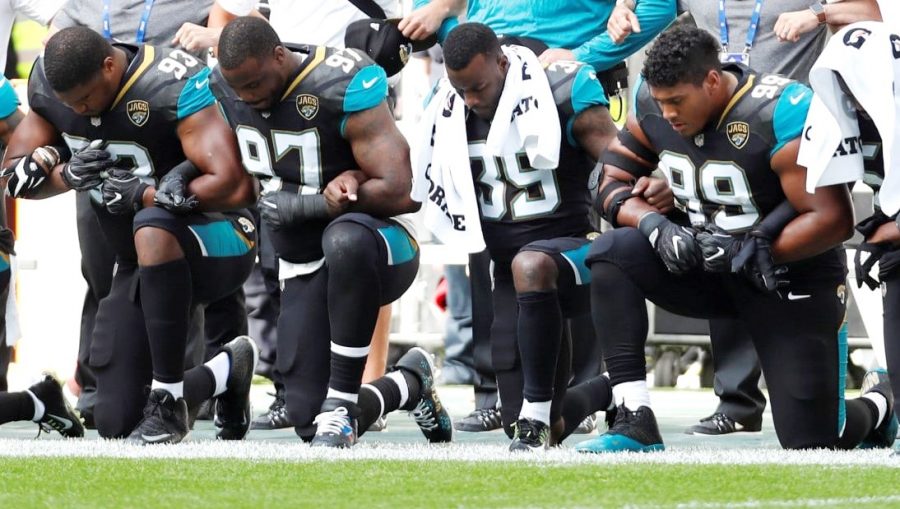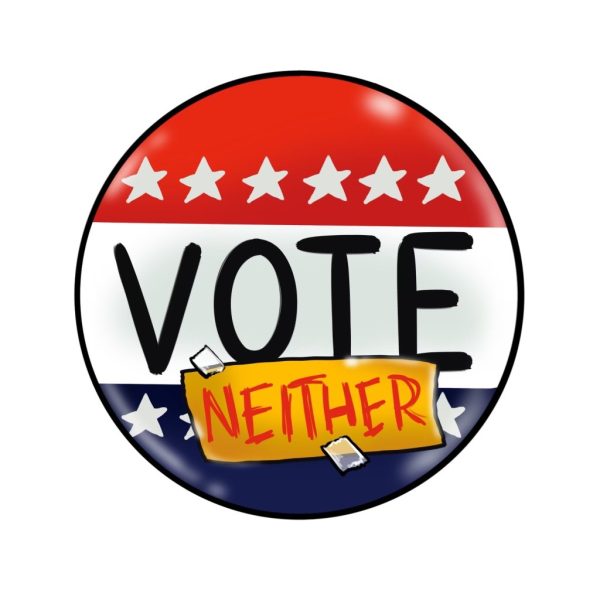Kneeling for anthem warrants (just) punishment
photo by Paul Childs
Jacksonville Jaguars Calais Campbell (93), Malik Jackson (97), Tashaun Gipson (39) and Eli Ankou (99) kneel during the playing of the U.S. national anthem before a game against the Baltimore Ravens in London on Sept. 24.
When 200 NFL players did it on Sept. 24 in response to President Donald Trump’s comments on the matter, kneeling for the national anthem once again gained nationwide attention.
The protest has spread into high school sports, a realm where NFL players serve as role models, causing controversy in its wake. Kneeling, and protesting the anthem in general, has disappointingly become a common sight across the country. Enough that the question must be asked: “What’s the correct way to respond?”
Those who choose to kneel during the playing of the national anthem, and disrespecting this nation and the people who support it, should be held accountable. However, the consequences must be appropriate.
In Texas, two players protested the anthem, one knelt and the other raised a fist, and both were kicked off the team. Their coach, a former Marine, ordered them to leave their uniforms at the bench. Meanwhile, in Missouri, a small Christian school vowed to not play against schools whose players kneeled for the anthem. And in Louisiana, a principal sent out a letter home saying that kneeling for the anthem will result in suspension or removal from the team.
This is where things fall into a moral grey area. At the NFL level, no player has been issued fines, suspended, or released for kneeling. However, high school coaches and administration are not as lenient, which is good, to an extent. Even though kneeling is a disrespectful act that warrants consequence, it must be handled in a delicate manner, as this still falls under the category of a peaceful protest.
So, the best way to punish individuals who choose to kneel before the flag during the national anthem should be something that is short in duration, yet firm.
One of these could be extra laps before a game or during practice, or perhaps it could be being benched for a drive, or a half.
However, there is one solution that can prevent everything: just do not kneel.
Now, this is not to discourage people who want to display their dissatisfaction with social issues or the government, this is not what is being discussed; I’m simply suggesting that they choose another method, one that is not disrespectful toward the flag and nation.
Two popular alternatives to kneeling have been the raising of the fist, done by New England Patriots Devin McCourty and Martellus Bennett, and the linking of arms, a show of unity, which was performed by multiple teams on Sept. 24, including the Dallas Cowboys, Arizona Cardinals and New York Jets.
These protests manage to walk the fine line that is displaying their grievances while still respecting the nation. It still involved standing.
During the national anthem, and the pledge of allegiance, people must stand, remove headwear, and place their hands over their hearts. Each act is representative of people’s views. Standing is showing respect, and removing headwear and putting the right hand over the heart indicates satisfaction. By not doing either one of the latter, those that wish to express their opinions and values openly may do so while still paying respect to the flag, and the people, of the country they call home.
In September of 2016, Colin Kaepernick started a movement. While the motivations behind it made sense, the method by which he displayed his grievances was disrespectful. However, what’s done is done. Kneeling during the national anthem has become a staple in not just the NFL, but the entire sporting world; catcher Bruce Maxwell of the Oakland Athletics became the first MLB player to kneel for the anthem on Sept. 23.
I hope that none of our high school athletes choose to participate in this protest, but if they do, coaches and administrators must be able to respond to it in a manner that suits the act.
Your donation will support the student journalists of Hagerty High School. Your contribution helps us publish six issues of the BluePrint and cover our annual website hosting costs. Thank you so much!


![Its The Little Things: [CENSORED]](https://hhsblueprint.com/wp-content/uploads/2024/04/IMG_4644-600x384.jpeg)




